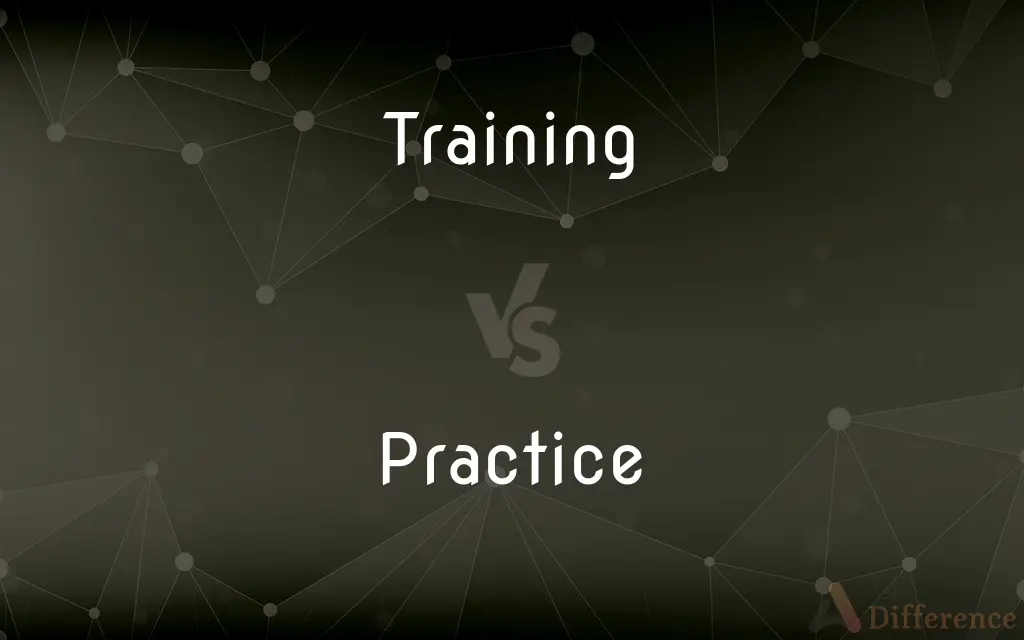Training vs. Practice — What's the Difference?
By Tayyaba Rehman & Fiza Rafique — Updated on April 23, 2024
Training involves structured skill development under guidance, focusing on holistic improvement, while practice emphasizes repetitive actions to enhance specific skills.

Difference Between Training and Practice
Table of Contents
ADVERTISEMENT
Key Differences
Training is typically structured and guided by a coach or instructor, aiming to improve overall ability in a particular field. Whereas practice is often self-directed and repetitive, focusing on refining specific skills or techniques.
Training sessions are usually designed to progress through various aspects of a skill or discipline, integrating both theoretical and practical elements. On the other hand, practice may involve repeatedly performing the same task or drill to gain mastery.
Training can include a wide range of activities, including physical conditioning, mental strategies, and technical proficiency, depending on the field. While practice tends to be more narrowly focused, sometimes isolating just one component of a skill.
Training often incorporates feedback from trainers or technology, providing insights that lead to improved performance. Whereas practice might not always have external feedback, relying more on self-assessment and correction.
Training is essential for acquiring new skills and knowledge necessary for advancement in sports, arts, or professions. While practice is crucial for maintaining and polishing those skills once they are acquired.
ADVERTISEMENT
Comparison Chart
Goal
Holistic improvement and acquisition of new skills
Refinement and perfection of existing skills
Structure
Structured by an instructor or program
Often unstructured or self-directed
Feedback
Includes professional feedback and assessments
Primarily self-monitored, less formal feedback
Activities
Diverse, covering various facets of the skill or field
Repetitive, focused on specific areas
Dependency on others
Often requires a coach, trainer, or structured environment
Can be conducted independently or with minimal help
Compare with Definitions
Training
Preparation that develops skills, knowledge, and behavior.
Their training included handling emergency situations.
Practice
Regular performance or exercise of an activity or skill to acquire or maintain proficiency in it.
Daily piano practice is essential for her recital.
Training
A process of learning and development with a structured curriculum.
She attended a rigorous training program to become a certified nurse.
Practice
A way of operation or behavior.
Their firm's practice of hiring interns has proven beneficial.
Training
Activity aimed at enhancing one's skills for a particular job or activity.
He went through specialized pilot training before solo flights.
Practice
The repetition of an activity to improve a skill.
Practice in solving math problems made him an expert.
Training
Organized practice and instruction with specific goals in mind.
The team’s training sessions are crucial before the tournament.
Practice
The actual application or use of an idea, belief, or method.
She puts the theory into practice by using innovative teaching methods.
Training
A period of exertion or practice to improve performance.
Marathon runners undergo months of intense training.
Practice
The customary, habitual, or expected procedure of something.
It is good practice to check your work before submission.
Training
Training is teaching, or developing in oneself or others, any skills and knowledge or fitness that relate to specific useful competencies. Training has specific goals of improving one's capability, capacity, productivity and performance.
Practice
The actual application or use of an idea, belief, or method, as opposed to theories relating to it
The principles and practice of teaching
The recommendations proved too expensive to put into practice
Training
The process or routine of one who trains.
Practice
The customary, habitual, or expected procedure or way of doing of something
Modern child-rearing practices
Product placement is common practice in American movies
Training
The state of being trained.
Practice
Repeated exercise in or performance of an activity or skill so as to acquire or maintain proficiency in it
It must have taken a lot of practice to become so fluent
Training
Present participle of train
Practice
US spelling of practise
Training
Action of the verb to train. en
Practice
To do or perform habitually or customarily; make a habit of
Practices courtesy in social situations.
Training
The activity of imparting and acquiring skills.
Practice
To do or perform (something) repeatedly in order to acquire or polish a skill
Practice a dance step.
Training
The result of good social upbringing.
Practice
To give lessons or repeated instructions to; drill
Practiced the students in handwriting.
Training
(computing) The process by which two modems determine which protocol and speed to use; handshaking.
Practice
To work at, especially as a profession
Practice law.
Training
(voice recognition) The recording of multiple samples of a user's voice to aid pattern recognition.
Practice
To carry out in action; observe
Practices a religion piously.
Training
The act of one who trains; the act or process of exercising, disciplining, etc.; education.
Practice
(Obsolete) To plot (something evil).
Training
Activity leading to skilled behavior
Practice
To do something repeatedly in order to acquire or polish a skill
With any musical instrument, you need to practice to get better.
Training
The result of good upbringing (especially knowledge of correct social behavior);
A woman of breeding and refinement
Practice
To work at a profession
How long has that lawyer been practicing?.
Practice
To do or perform something habitually or repeatedly
Why not practice in the same manner that you preach?.
Practice
(Archaic) To intrigue or plot.
Practice
A habitual or customary action or way of doing something
Makes a practice of being punctual.
Practice
Repeated performance of an activity in order to learn or perfect a skill
Practice will make you a good musician.
Practice
A session of preparation or performance undertaken to acquire or polish a skill
Goes to piano practice weekly.
Scheduled a soccer practice for Saturday.
Practice
(Archaic) The skill so learned or perfected.
Practice
The condition of being skilled through repeated exercise
Out of practice.
Practice
The act or process of doing something; performance or action
A theory that is difficult to put into practice.
Practice
Exercise of an occupation or profession
The practice of law.
Practice
The business of a professional person
An obstetrician with her own practice.
Practice
A habitual or customary action or act
That company engages in questionable business practices. Facial tattooing is a standard practice among certain peoples.
Practice
(Law) The procedure for trial of cases in a court of law, usually specified by rules.
Practice
The act of tricking or scheming, especially with malicious intent.
Practice
A trick, scheme, or intrigue.
Practice
Repetition of an activity to improve a skill.
He will need lots of practice with the lines before he performs them.
Practice
An organized event for the purpose of performing such repetition.
Being on a team is hard: you're always having to go to practice while everyone else is taking it easy.
I have choir practice every Sunday after church.
Practice
The ongoing pursuit of a craft or profession, particularly in medicine or the fine arts.
Practice
(countable) A place where a professional service is provided, such as a general practice.
She ran a thriving medical practice.
Practice
The observance of religious duties that a church requires of its members.
Practice
A customary action, habit, or behaviour; a manner or routine.
It is the usual practice of employees there to wear neckties only when meeting with customers.
It is good practice to check each door and window before leaving.
Practice
Actual operation or experiment, in contrast to theory.
That may work in theory, but will it work in practice?
Practice
(legal) The form, manner, and order of conducting and carrying on suits and prosecutions through their various stages, according to the principles of law and the rules laid down by the courts.
This firm of solicitors is involved in family law practice.
Practice
Skilful or artful management; dexterity in contrivance or the use of means; stratagem; artifice.
Practice
(math) A easy and concise method of applying the rules of arithmetic to questions which occur in trade and business.
Practice
(US) practise
Practice
Frequently repeated or customary action; habitual performance; a succession of acts of a similar kind; usage; habit; custom; as, the practice of rising early; the practice of making regular entries of accounts; the practice of daily exercise.
A heart . . . exercised with covetous practices.
Practice
Customary or constant use; state of being used.
Obsolete words may be revived when they are more sounding or more significant than those in practice.
Practice
Skill or dexterity acquired by use; expertness.
Practice
Actual performance; application of knowledge; - opposed to theory.
There are two functions of the soul, - contemplation and practice.
There is a distinction, but no opposition, between theory and practice; each, to a certain extent, supposes the other; theory is dependent on practice; practice must have preceded theory.
Practice
Systematic exercise for instruction or discipline; as, the troops are called out for practice; she neglected practice in music.
Practice
Application of science to the wants of men; the exercise of any profession; professional business; as, the practice of medicine or law; a large or lucrative practice.
Practice is exercise of an art, or the application of a science in life, which application is itself an art.
Practice
Skillful or artful management; dexterity in contrivance or the use of means; art; stratagem; artifice; plot; - usually in a bad sense.
He sought to have that by practice which he could not by prayer.
Practice
A easy and concise method of applying the rules of arithmetic to questions which occur in trade and business.
Practice
The form, manner, and order of conducting and carrying on suits and prosecutions through their various stages, according to the principles of law and the rules laid down by the courts.
Practice
To do or perform frequently, customarily, or habitually; to make a practice of; as, to practice gaming.
Practice
To exercise, or follow, as a profession, trade, art, etc., as, to practice law or medicine.
Practice
To exercise one's self in, for instruction or improvement, or to acquire discipline or dexterity; as, to practice gunnery; to practice music.
Practice
To put into practice; to carry out; to act upon; to commit; to execute; to do.
As this advice ye practice or neglect.
Practice
To make use of; to employ.
In malice to this good knight's wife, I practiced Ubaldo and Ricardo to corrupt her.
Practice
To teach or accustom by practice; to train.
In church they are taught to love God; after church they are practiced to love their neighbor.
Practice
To perform certain acts frequently or customarily, either for instruction, profit, or amusement; as, to practice with the broadsword or with the rifle; to practice on the piano.
Practice
To learn by practice; to form a habit.
They shall practice how to live secure.
Practice first over yourself to reign.
Practice
To try artifices or stratagems.
He will practice against thee by poison.
Practice
To apply theoretical science or knowledge, esp. by way of experiment; to exercise or pursue an employment or profession, esp. that of medicine or of law.
[I am] little inclined to practice on others, and as little that others should practice on me.
Practice
A customary way of operation or behavior;
It is their practice to give annual raises
They changed their dietary pattern
Practice
Systematic training by multiple repetitions;
Practice makes perfect
Practice
Translating an idea into action;
A hard theory to put into practice
Differences between theory and praxis of communism
Practice
The exercise of a profession;
The practice of the law
I took over his practice when he retired
Practice
Knowledge of how something is usually done;
It is not the local practice to wear shorts to dinner
Practice
Learn by repetition;
We drilled French verbs every day
Pianists practice scales
Practice
Avail oneself to;
Apply a principle
Practice a religion
Use care when going down the stairs
Use your common sense
Practice non-violent resistance
Practice
Carry out or practice; as of jobs and professions;
Practice law
Practice
Engage in a rehearsal (of)
Common Curiosities
Can training be done without practice?
Effective training usually incorporates practice, but it also includes other elements like theoretical learning and diverse activities.
Can practice be part of a training program?
Yes, practice is often a crucial component of training programs, helping consolidate what is taught during training sessions.
Is practice more important than training?
Neither is more important; they complement each other. Training introduces and refines skills, while practice maintains and enhances them.
How does feedback differ in training versus practice?
Training often provides structured feedback from professionals, whereas practice involves more self-evaluation or informal feedback.
What roles do trainers and coaches play in training and practice?
In training, trainers and coaches play a crucial role in providing structured guidance and feedback, whereas in practice, their role might be less direct, focusing on monitoring progress and offering occasional corrections.
What is the main difference between training and practice?
Training is a structured process focusing on overall skill development, while practice is repetitive execution aimed at refining specific skills.
How often should one engage in training compared to practice?
Training schedules can vary based on goals and the skill being developed, often consisting of intense, periodic sessions, while practice should be regular and frequent to maintain and enhance skills.
What is the impact of technology on training and practice?
Technology can greatly enhance both by providing tools for better feedback, personalized programs, and more efficient techniques, benefiting learners at all levels.
Can practice lead to overtraining?
Yes, excessive practice without adequate rest or varied activities can lead to overtraining, where performance may plateau or decline due to fatigue or injury.
Is there a best time of day for training or practice?
The best time can vary depending on the individual's schedule and energy levels, though many find that training is most effective when energy is highest, often in the morning, while practice sessions might be shorter and more flexible.
How do beginners' training and practice differ from those of professionals?
Beginners often require more structured training to build foundational skills and knowledge, whereas professionals focus more on practice to refine and maintain their advanced skills.
How should one balance training and practice in a learning schedule?
A balanced schedule should include regular training sessions to introduce and refine skills and daily or frequent practice sessions to consolidate these skills and make gradual improvements.
How does the motivation differ between training and practice?
Training might be driven by the goal of achieving a new level of skill or qualification, while the motivation for practice is typically about improvement and mastery of known skills.
What are common mistakes in training and practice?
Common mistakes in training include not having clear objectives or a lack of variety, which can lead to disinterest or plateauing. In practice, repetitive without progress tracking or goals can lead to inefficiency and lack of motivation.
What role does feedback play in the effectiveness of training and practice?
Feedback is essential in training for making adjustments and improvements, while in practice, feedback helps in self-assessment and identifying areas needing more focus.
Share Your Discovery

Previous Comparison
Colander vs. Sieve
Next Comparison
Pause vs. ResumeAuthor Spotlight
Written by
Tayyaba RehmanTayyaba Rehman is a distinguished writer, currently serving as a primary contributor to askdifference.com. As a researcher in semantics and etymology, Tayyaba's passion for the complexity of languages and their distinctions has found a perfect home on the platform. Tayyaba delves into the intricacies of language, distinguishing between commonly confused words and phrases, thereby providing clarity for readers worldwide.
Co-written by
Fiza RafiqueFiza Rafique is a skilled content writer at AskDifference.com, where she meticulously refines and enhances written pieces. Drawing from her vast editorial expertise, Fiza ensures clarity, accuracy, and precision in every article. Passionate about language, she continually seeks to elevate the quality of content for readers worldwide.
















































